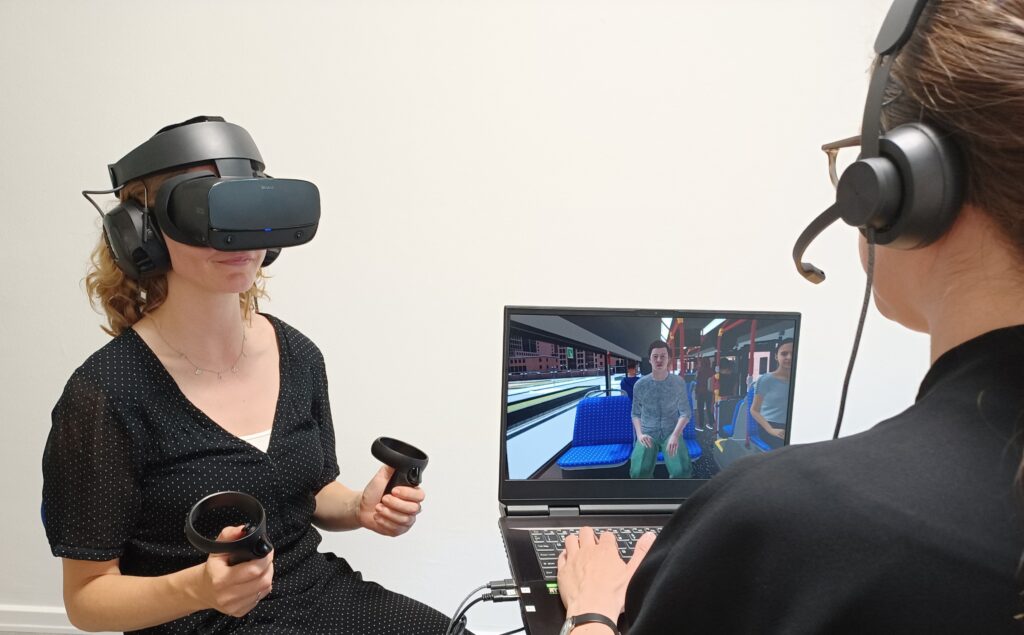Based at the Mental Health Center Copenhagen, University of Copenhagen Denmark, VIRTU Research Group is at the forefront of developing virtual reality (VR) based treatments for psychiatric disorders. VIRTU utilizes the immersive power of VR to create safe and controlled environments where patients can confront their challenges.
Starting off with employing VR-based treatments for people experiencing treatment-resistant auditory hallucinations, VIRTU has witnessed a rapid increase in research studies that now covers prominent mental health disorders (psychosis, autism, anxiety, eating disorders, and VR for more general use at psychiatric intensive care units). Given the multiple and creative options inherent in VR therapies, it can be regarded as a transdiagnostic tool that may work in treating a diverse range of mental health conditions.
With continued research, the VIRTU’s innovative approach has the potential to transform the treatment landscape for psychosis, offering patients new avenues to manage their condition and improve their quality of life.

What is our research about?
Acknowledging the increasing rates of mental health disorders, it is imperative to find new, effective treatments that can be scaled for clinical implementation. VR is a promising technologically advanced mental health tool with high ecological validity. In VR, patients can be confronted with feared situations eliciting psychiatric symptoms, and in a safe and highly controlled manner work with a therapist to gain increased control over the symptoms. VR brings the important element of working with “hot cognition” to the therapy room as it allows for eliciting symptoms directly in therapy compared to relying on patients remembering difficult situations.
VIRTU conducts large-scale clinical trials, with many being the currently largest worldwide, to establish the evidence of VR-interventions for mental health disorders. Preliminary findings reveal VR-based treatments to be feasible, acceptable, and safe along with highly effective in treating severe mental disorders. At VIRTU, the transformative potential has been witnessed in several case stories of people experiencing cessation of psychotic symptoms after a brief VR intervention.
What is the next step?
As the next steps in our research endeavours VIRTU will:
- Investigate the potential cost-effectiveness of VR treatments compared to standard interventions for psychiatric symptoms.
- Use data from our clinical trials to understand what may predict a treatment response. As interventions in mental health are not a “one size fits all” this will bring us closer to answering the question of which therapies work for whom? And may aid in allocating scarce clinical resources to those who might benefit from a VR intervention.
- Investigate psychological (motivation, symptom level etc.) and biological (EEG and MRI) variables that may predict a favorable therapy outcome.
Can VR treatments be implemented in clinical care?
Due to the many positive case stories in Denmark, policymakers have been highly supportive in progressing the positive research findings of VR interventions into daily clinical practice. Initial discussions have been made as to how this upscaling procedure could be conducted. Although the clinical resources are sparse, the brevity of the VR interventions (7-10 sessions) makes it feasible to implement this therapy approach in clinical psychiatry. The plans for implementation have further been spurred by the great enthusiasm of clinicians in the potential of having this treatment offered. VIRTU has additionally created a model for training and supervision of clinicians in this therapy approach making the implementation a realistic and feasible endeavor.
Want to know more about our research?
Watch this episode of Al Jazeera MINDSET on the future of tech and mental health:
Visit the VIRTU Research Group’s local webpage at: https://www.psykiatri-regionh.dk/virtu





